- Home
- Lauren Tarshis
I Survived the Great Chicago Fire, 1871 Page 4
I Survived the Great Chicago Fire, 1871 Read online
Page 4
And now those nightmares were coming true.
The wall of fire roared down the street, devouring everything in its path. The wind gusted, a hot and poisonous blast that almost knocked Oscar off his feet. Oscar watched in horror as a blazing sheet peeled off the fire. It swirled through the air, a flaming twister bigger and more horrifying than anything Oscar could have imagined. It flew down the street, hundreds of yards.
BOOM!
It exploded into a tall building, igniting it.
Now the street was blocked on both sides, with the flames spreading fast.
Oscar stood there, frozen in fear.
He had no idea what to do, where to go.
But then he heard someone calling his name.
“Oscar!”
It rose up above the fire’s lion roar, like a kindly giant calling from his castle in the sky.
Oscar whirled around.
A shadow appeared through the cloud of smoke.
He saw a familiar face, and he let himself fall into the strong arms that reached out for him.
It was Mr. Morrow.
“Your mother is safe at my house!” Mr. Morrow shouted over the roaring fire.
One of Mr. Morrow’s friends had taken Mama there in a buggy, hours before.
“My house is far to the north,” he said. “The flames won’t reach there. She didn’t want to leave the hotel. But I promised her that I would find you.”
He explained this as they ran to the corner. The streets were practically deserted; almost everyone else on the block had already fled.
Mr. Morrow had stayed behind, risking his life to look for Oscar.
Oscar opened his mouth to thank him, to tell him about Jennie and Bruno.
But his voice was wrecked from the smoke and his shouting. And he didn’t know how to begin. A cab stood at the corner, the horse covered with a soaking-wet blanket to protect it from the sparks.
A familiar voice shouted to them through the smoke. “Got him, Charlie?”
It was Joseph, the cabdriver Oscar had met earlier.
“I do!” Mr. Morrow called.
“Mr. Morrow’s got half the city of Chicago looking for you, son,” Joseph said as they climbed in.
Seconds later they were inside the buggy, and the horse took off in a gallop.
The two walls of flame were moving toward each other, but Joseph steered his horse through the middle and then swerved onto a side street that the fire hadn’t yet touched.
Most horses would have refused to budge in a fire like this, or would be rearing up in wild panic. But the old nag was calm, and Joseph barely had to snap the reins to keep her moving quickly.
“Joseph is taking us to the nearest bridge,” Mr. Morrow said. “We’ll cross the river there and make our way to my house. There are fires on the other side, but nothing like this.”
Mr. Morrow shook his head.
“I can’t believe it, Oscar,” he said. “So much is gone.”
The courthouse was in ruins, Mr. Morrow said. So were the new opera house, the grand department stores, and the huge factories and train depots. Thousands of houses were gone.
“I don’t know what will be left when this is all over,” Mr. Morrow said.
The bridge came into view. It was wide, with a roadway in the center and two narrow walkways on either side.
Oscar’s heart sank as he saw the hundreds of people knotted together on the bridge, the dozens of buggies creeping along.
“Charlie,” Joseph said. “You’re better off on foot. And I need to get up to my sister’s house, to check on her.”
“Of course,” Mr. Morrow said.
He and Oscar climbed out, and Mr. Morrow reached up to shake hands with Joseph.
“Thanks. I’ll see you, friend,” Mr. Morrow said.
“You sure will,” Joseph said.
But Oscar could see the doubt in both men’s eyes.
* * *
They were standing in front of a paint warehouse, and Mr. Morrow looked at the bridge. His face was etched with worry.
“I don’t like the look of that bridge,” he said. “The roadway is made of wood. It could burn at any time. If the fire comes, all of those people will be trapped. It will be complete panic.”
Oscar remembered the horror of being stuck in the stampeding crowd with Jennie and Bruno. He knew Mr. Morrow was right, that the bridge was unsafe. But how else could they get across the river?
He looked out on the water. Farther up were boats steaming and sailing in both directions. But this stretch was mostly empty.
“There,” Mr. Morrow said, spotting a rowboat tied up along the riverbank. “I used to row across all the time when I was a kid. It takes just a few minutes.”
They hurried to the boat.
“Climb in,” Mr. Morrow said. “I’m going to see if I can find another set of oars.”
It was only when Oscar got into the boat that he realized his whole body was shaking. But the thought of seeing Mama made him feel stronger.
“Here,” Mr. Morrow said, handing Oscar a set of oars. “We’re going to have to move very quickly.”
Soon they had shoved off and were rowing with all their might.
Oil fumes rose up, and something worse — that slaughterhouse stench. Garbage and dead rats floated around them. With so many factories lining the shores, Oscar knew the water must be a filthy witch’s brew.
The wind blew hard, sending showers of sparks over the river.
Shouts and screams rang out from the bridge. Oscar saw that a wagon in the middle of the bridge roadway had caught fire.
Oscar closed his eyes and tried to block out the screams.
Next came splashes, and Oscar refused to think about what — or who — was falling off the bridge and into the river.
He looked in the other direction and gasped in horror.
A large sailboat was racing through the water. The mast was burning. There was nobody at the helm. It looked like a ghost ship, evil and glowing.
And it was heading right for them.
“Row faster, Oscar!” Mr. Morrow shouted.
But the flaming boat was too big and moving too quickly for them to get out of the way in time.
“Oscar!” Mr. Morrow said. “Can you swim?”
“Yes,” Oscar said.
“Good,” he said. “Swim to shore. When you get to the other side, get yourself to the lakeshore.”
Why was Mr. Morrow telling him this?
There was no time to ask.
The burning ship was closing in.
“Jump!” Mr. Morrow cried.
Oscar threw himself over the side. The cold water slapped him and burned his skin. He started swimming as fast as he could, keeping his eyes and mouth closed against the foul water.
Crash!
Sparks flew up all around as the flaming ship hit the rowboat, slicing it in half and setting it on fire.
Oscar kept swimming. He glanced over his shoulder, expecting to see Mr. Morrow right beside him.
But he wasn’t.
Oscar stopped and turned, churning his legs and arms to stay afloat.
Through the smoke, he saw something bobbing in the water.
It was Mr. Morrow clinging to a small piece of wood and struggling to keep his head above water.
Now Oscar understood why Mr. Morrow didn’t think he could make it to the other side of the river. He couldn’t swim!
Oscar should have known — Papa couldn’t swim either, even though he grew up near the ocean. Mama was one of the few people Oscar knew who could swim, and it was she who had taught Oscar.
“Keep going, Oscar!” Mr. Morrow cried.
Oscar saw a huge piece of wood floating near him. He grabbed it and kicked as hard as he could to get to Mr. Morrow.
“Mr. Morrow! Grab hold.”
Mr. Morrow looked up in surprise and relief as Oscar thrust the wood toward him.
And that’s when Oscar noticed that back on the south shore, from where they’d
just escaped, the roof of the paint warehouse had caught fire.
His heart leaped into his throat. Any minute, there would be a massive explosion.
They had to get away now!
They both clung to the makeshift raft, kicking frantically.
And then —
KABOOM!
Behind them, the paint factory exploded with a deafening blast.
Oscar waited for the crush of burning wood, for flames to reach out and grab them.
But instead, the force of the explosion created a wave that came up behind them. It propelled them forward, out of the fire’s reach, toward the safety of the north shore.
They landed with a thud on the muddy riverbank. Oscar looked back, amazed to see that the river itself was now on fire.
He could barely believe they’d made it. Yet he felt little relief.
Oscar stared over the flaming river. The entire south side of the city was in the grip of fire and smoke. And somewhere in the middle of it all were Jennie and Bruno.
* * *
Oscar told Mr. Morrow all about them as they trudged away from the river. Mr. Morrow listened closely, and Oscar sensed that he was using Oscar’s words to paint a picture of Bruno and Jennie in his mind.
“We’ll find them, Oscar,” he kept saying. “I found you, didn’t I?”
But the search for Jennie and Bruno would have to wait. Because once again Oscar and Mr. Morrow found themselves in a fight for their lives. They kept trying to get back to Mr. Morrow’s house, but the wind grew stronger and stronger, sweeping ferocious fires all through the north side of the river. Entire blocks burned within minutes. Flames chased after Oscar and Mr. Morrow. Each time they thought they were safe, a new fire would erupt, and they were on the run again.
Their last hope was Lake Michigan, which stretched out to the east of the city.
As the fires closed in behind them, they waded into the freezing water, ready to duck under if the flames attacked. There were hundreds of people all around them, and the crowd grew to the thousands as the night wore on.
There were entire families with their horses and with their wagons piled high with furniture, fancy ladies in their ruffled dresses and jewels, children who had been separated from their parents. They all stood gasping in the smoky air, shivering in the freezing water.
The hours crept by, the sun came up, and still the fires raged out of control. It would be another endless day before finally the fires began to tire, when the winds lost their fury, when it was finally safe enough to wade out of the freezing water.
It took hours more for Oscar and Mr. Morrow to make their way back to his house in the pouring rain. They were numb with cold and shock, miserable with thirst, and wheezing in the smoky air.
But finally they made it to Mr. Morrow’s stone house, one of the few houses still standing. And there, on the porch, was Mama. Oscar got the idea that she’d been standing there for days.
She sprinted off the porch and into the drenching rain to meet them.
Her face was as pale as bone.
Oscar ran to her, throwing himself into her arms.
They fell to their knees, their tears mixing with the raindrops that put out the last flickering flames of Chicago’s fire.
The day was bright and clear. Oscar stood in Mr. Morrow’s studio.
Mr. Morrow had been right — this was Oscar’s favorite room in the house. He liked the view of the lake in the distance.
But best of all were Mr. Morrow’s paintings that lined the walls and crowded the shelves. Oscar’s favorites, of course, were four paintings that Mr. Morrow had created of their farm in Castle. Oscar came up here every day to look at them.
Voices drifted from the kitchen, along with the scent of baking cookies. Oscar breathed deep, wanting to take in the sweet smells. Finally he could take a breath without doubling over into a coughing fit. His lungs were healing, now, his burns and cuts scabbing over. But he couldn’t shake the nightmares that haunted him every night. It was always the same, how he’d wake up shouting two words over and over:
“Jennie! Bruno!”
Oscar would sit in bed, his heart hammering, tears streaming down his cheeks, as he thought of them lost and alone in the burning city.
* * *
The search for Jennie and Bruno had started the morning after Oscar and Mr. Morrow got back to the house. Dozens of Mr. Morrow’s friends helped them. They scoured the lakefront, where thousands of people were living in makeshift tents. They searched Lincoln Park, which was packed with thousands more.
Day after day they all searched, but there was no sign of Jennie and Bruno. And there were moments when Oscar feared the worst.
“Have hope,” Mr. Morrow kept saying.
But it was hard to have hope when all Oscar could see in any direction was smoldering ruins. Hundreds of people were dead, and four miles of the city had burned to the ground.
As they walked through the streets, Mr. Morrow kept his arm around Oscar’s shoulders. He’d point to men carting away wagonloads of wreckage, at the new shacks popping up on still-smoldering lots.
Mr. Morrow reminded Oscar of Papa, that day in the ruined forest. Just as Papa had seen those little green shoots popping through the ash, Mr. Morrow already saw signs that Chicago would be rebuilt.
And then Mr. Morrow had the idea of drawing Jennie and Bruno’s picture and having it printed in the newspaper. Oscar described their faces, and Mr. Morrow’s pencil brought them to life. The picture was printed in the Chicago Tribune, along with an ad:
Mr. Charles Morrow and the Chicago police seek information about two missing children, Jennie, approximately 9, and Bruno, approximately 3.
Oscar had insisted that Mr. Morrow add one more detail to the picture: the battered purple lady’s hat on Bruno’s head.
The very next day, the police received a tip from a woman on the city’s west side, in a neighborhood that hadn’t been burned. The woman had always been suspicious of one of her neighbors. The man lived alone, but rough-looking boys were always showing up at odd hours, often carrying large sacks and suitcases through the back door of the house.
The woman was reading the newspaper, and Mr. Morrow’s drawing caught her eye. She’d seen two kids in front of the neighbor’s house just that morning. She wouldn’t have looked twice, except for something very strange about the boy — the purple lady’s hat on his head.
Oscar had been up here in the studio, standing in this exact spot, when he’d heard the clatter of hooves outside. He’d looked out the window, and there was Joseph’s cab, pulled by his faithful old nag. Oscar figured it was more of Mr. Morrow’s friends coming to stay. Mr. Morrow and Mama kept the door wide open to anyone who needed a bed or a meal, and the house was overflowing.
Oscar had turned away from the window, but then he’d heard a croaking voice shouting up to him.
“Occar!”
He’d looked out the window and his heart just about burst apart — it was Jennie and Bruno. They were ragged and dusty but all in one piece. Oscar’s knees momentarily went weak, and then he’d practically flown down the stairs.
Oscar had scooped Bruno up and held him tight. He grabbed Jennie’s hand.
He could hardly believe it. He still couldn’t. They were back together — for good now. Mama and Mr. Morrow made sure they all understood that.
Oscar had to wait until later that night, after Bruno was asleep, for Jennie to tell Oscar and Mama and Mr. Morrow the whole incredible story — how they’d escaped the fire, how Otis had brought them to the house of a man he obviously knew very well. It turned out this man was the gang’s real leader.
“What was he like?” Mama asked.
“Believe it or not, he didn’t act like a wicked criminal,” Jennie said. “He gave us plenty to eat, and he had a very friendly smile.”
But there was one thing about the man Jennie said she’d never forget.
“The man had only one ear.”
Oscar and Mama had stared at
each other in disbelief.
But it turned out to be true: The man was Earless Max Kildair.
And Papa had been right about the gangster still being up to no good.
Now Earless was in jail, where he belonged. Otis Webber and his gang had disappeared, but Jennie and Bruno wouldn’t have to worry about them anymore.
The police recovered thousands of dollars of silver and paintings from Kildair’s house. They also found three suitcases.
* * *
The baking smells were getting stronger, and Oscar heard pattering feet running up the stairs.
Bruno burst in, Papa’s badge pinned to his puffed-out chest.
“Occar!” he cried. “Come on! They ready!”
Jennie was right behind him. Her new dress was speckled with flour; she loved helping Mama in the kitchen.
She and Oscar grinned at each other. Her face was bright now, her braids glossy and straight. But looking at her, Oscar knew he’d always see that same brave girl who’d led him through the flames.
Bruno pulled Oscar toward the door.
“Come on, Occar!”
Oscar stayed behind for a minute to look at Mr. Morrow’s paintings of the farm. There was their barn that had survived the fire. There were the golden wheat fields that Papa had carved out of the wild prairie. There was their little house, where Oscar and Mama and Papa had been so happy. There was the front porch, where Mama and Mr. Morrow had sat talking and laughing late into the night.
And that’s when it hit Oscar: He could keep his promise to Papa. Every day he could look at Mr. Morrow’s paintings. He could watch over the farm from here. And he would look out these windows to watch as Chicago sprouted up again.
But now it was time to go downstairs with Jennie and Bruno, to join Mama and Mr. Morrow.
Finally Bruno would get his cookie.
Every I Survived book feels like a special occasion for me, a chance to travel back in time, to bring new characters to life. But this book, the eleventh in the I Survived series, is unique because the topic was picked by you, my readers. Thousands of I Survived readers participated in an online contest in which you chose one of three topics.

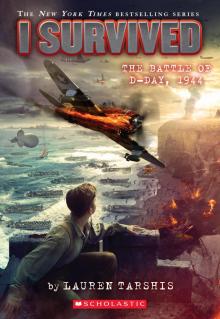 I Survived the Battle of D-Day, 1944 (I Survived #18)
I Survived the Battle of D-Day, 1944 (I Survived #18)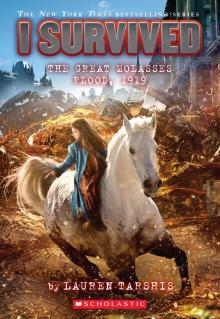 I Survived the Great Molasses Flood, 1919
I Survived the Great Molasses Flood, 1919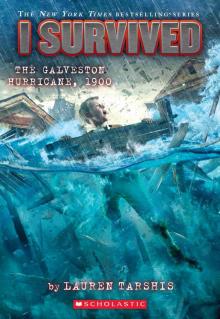 I Survived the Galveston Hurricane, 1900
I Survived the Galveston Hurricane, 1900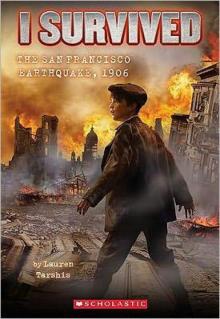 I Survived the San Francisco Earthquake, 1906
I Survived the San Francisco Earthquake, 1906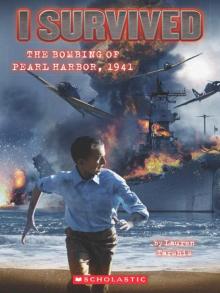 I Survived #4: I Survived the Bombing of Pearl Harbor, 1941
I Survived #4: I Survived the Bombing of Pearl Harbor, 1941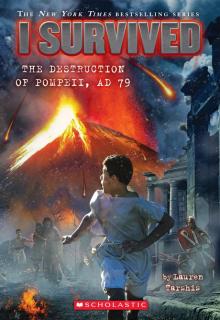 I Survived the Destruction of Pompeii, AD 79
I Survived the Destruction of Pompeii, AD 79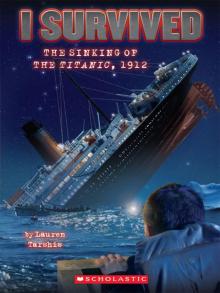 I Survived #1: I Survived the Sinking of the Titanic, 1912
I Survived #1: I Survived the Sinking of the Titanic, 1912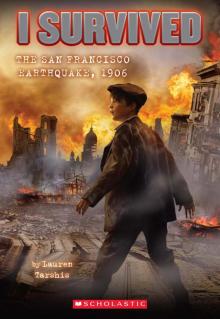 I Survived #5: I Survived the San Francisco Earthquake, 1906
I Survived #5: I Survived the San Francisco Earthquake, 1906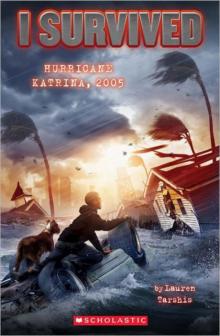 I Survived Hurricane Katrina, 2005
I Survived Hurricane Katrina, 2005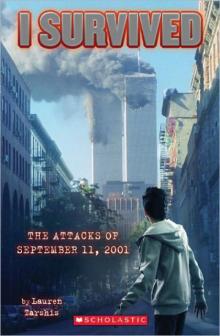 I Survived the Attacks of September 11th, 2001
I Survived the Attacks of September 11th, 2001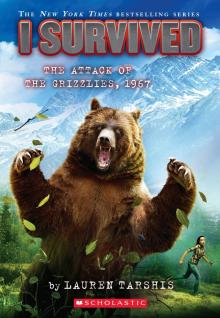 I Survived the Attack of the Grizzlies, 1967
I Survived the Attack of the Grizzlies, 1967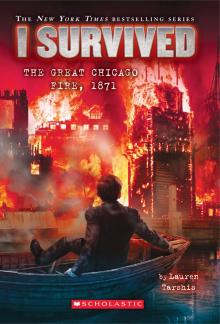 I Survived the Great Chicago Fire, 1871
I Survived the Great Chicago Fire, 1871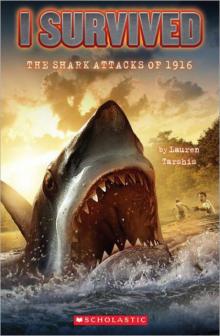 I Survived the Shark Attacks of 1916
I Survived the Shark Attacks of 1916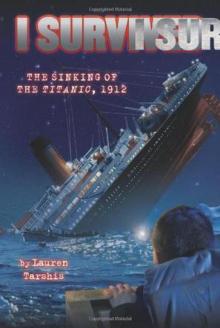 I Survived the Sinking of the Titanic, 1912
I Survived the Sinking of the Titanic, 1912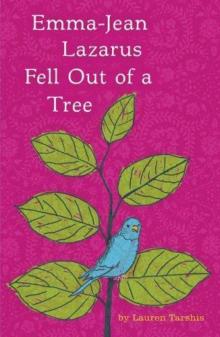 Emma-Jean Lazarus Fell Out of a Tree
Emma-Jean Lazarus Fell Out of a Tree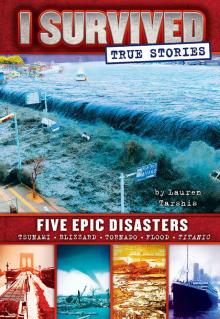 I Survived True Stories: Five Epic Disasters
I Survived True Stories: Five Epic Disasters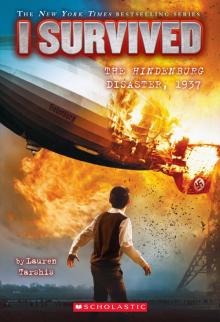 I Survived the Hindenburg Disaster, 1937
I Survived the Hindenburg Disaster, 1937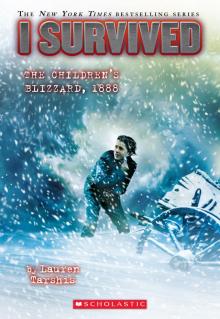 I Survived the Children's Blizzard, 1888
I Survived the Children's Blizzard, 1888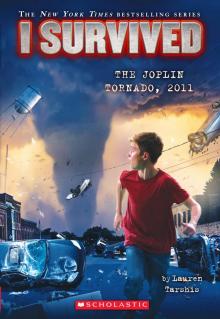 I Survived the Joplin Tornado, 2011
I Survived the Joplin Tornado, 2011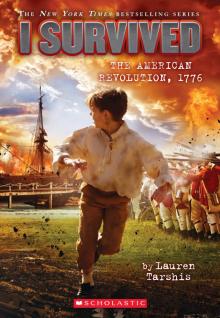 I Survived the American Revolution, 1776
I Survived the American Revolution, 1776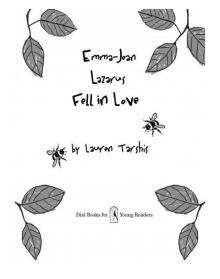 Emma Jean Lazarus Fell in Love
Emma Jean Lazarus Fell in Love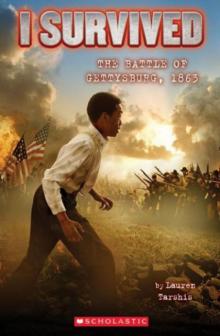 I Survived the Battle of Gettysburg, 1863
I Survived the Battle of Gettysburg, 1863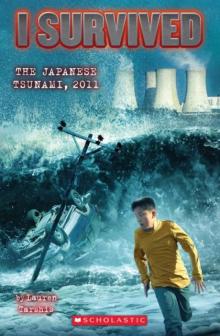 I Survived the Japanese Tsunami, 2011
I Survived the Japanese Tsunami, 2011